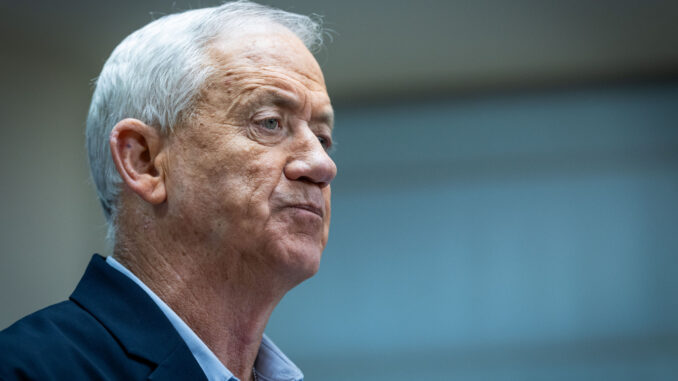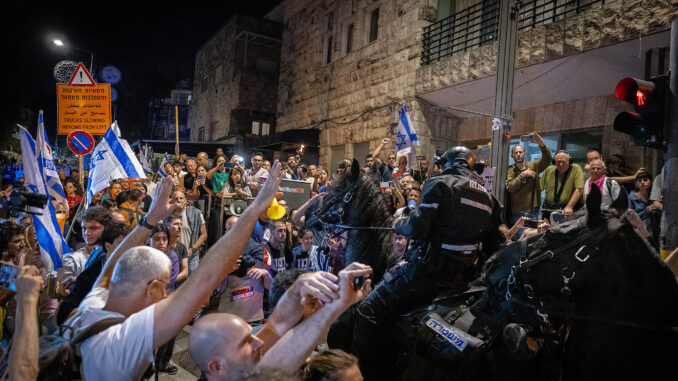Peloni: Without support from Bibi’s coalition, Gantz’ departure will only demonstrate his support for American dictates over Israeli victory. The timing of the call for September elections is timed not only to precede the American elections, but to also coincide with the beginning of the new school session in the fall when the families of those families who have been evacuated from the war zone have expectations of returning to their homes, ie the support for continuing the war may be at its weakest.
Netanyahu dismisses coalition partner’s appeal as ‘petty politics,’ claiming elections would harm the war effort, while opposition head Lapid says Israel can’t wait six months
 Head of the National Unity party Minister Benny Gantz holds a press conference at the Knesset, the Israeli parliament in Jerusalem, March 13, 2024. (Yonatan Sindel/ Flash90)
Head of the National Unity party Minister Benny Gantz holds a press conference at the Knesset, the Israeli parliament in Jerusalem, March 13, 2024. (Yonatan Sindel/ Flash90)
War Cabinet Minister Benny Gantz called Wednesday for Israel to hold early elections by September, partially wading into a swell of voices urging the government to step down, in light of wide dissatisfaction with the continued captivity of Israelis in Gaza and questions over how the war against Hamas is being waged.
In a televised press conference, Gantz insisted that going to the polls in some six months would be necessary to “maintain unity” and “renew trust” in the government he joined on an emergency basis following the October 7 onslaught.
The comments came only days after Prime Minister Benjamin Netanyahu publicly ruled out elections as a danger to national security, an argument reprised by his Likud party Wednesday night.
“We must agree on a date for elections in September, about a year from the war,” Gantz told reporters in the Knesset. “Setting such a date will allow us to continue the military effort, while signaling to the citizens of Israel that we will soon renew their trust in us.”
Stating that he has discussed the matter with Netanyahu in recent weeks and plans to continue to do so, Gantz suggested that early elections would provide Israel with international legitimacy — a likely reference to increasingly public comments by allies, particularly the US, regarding dissatisfaction with the continued rule of Netanyahu and his far-right allies.
“I believe Israeli society needs to renew its contract with its leadership and I think the only way to do it and still maintain the national effort in fighting Hamas… and other security challenges is by having an agreed election date,” Gantz told The Times of Israel, when asked to elaborate on his call.
“And I hope that my political partners and friends, and maybe some rivals as well, will agree to it because I think it serves all the country and all its sectors at the same time.”
Gantz’s comments prompted harsh criticism from both Netanyahu’s ruling Likud party and Opposition Leader Yair Lapid, who insisted that the centrist politician had not gone far enough.
“At a fateful moment for the State of Israel and in the midst of a war, Benny Gantz must stop engaging in petty politics just because of the disintegration of his party,” the Likud said in a statement, referring to the recent split between Gantz and New Hope – The United Right, led by Gideon Sa’ar.
“Elections now will inevitably lead to paralysis, division, harm to the fighting in Rafah and fatal damage to the chances of a hostage deal. The government will continue until all the goals of the war are achieved,” it said.
Lapid, meanwhile, insisted that Israel “cannot wait another six months until the worst, most dangerous and failed government in the country’s history goes home.”
Responding to increasing calls to hold an election, Netanyahu told reporters earlier this week that he believed elections would paralyze the country — “in the midst of the war, the moment before victory” — for up to eight months.
“It would paralyze negotiations for freeing our hostages and would bring an end to the war before the goals are completely achieved,” he said. “And the first who would welcome this is Hamas, and that tells you everything.”
Finance Minister Bezalel Smotrich, the head of the far-right Religious Zionism party, also dismissed the idea of holding elections in 2024.
“This is the time for war and victory. Not the time for politics,” he tweeted.
Trust in the government plummeted in the wake of the October 7 attack, with polls showing little appetite among Israel’s public for returning Netanyahu to power should elections be held. International support for Israel has also waned as the war has dragged on, with Washington indicating little patience for Netanyahu and his far-right allies, Religious Zionism and Otzma Yehudit.
In March, US Senate Majority Leader Chuck Schumer said new elections were needed once the war in Gaza winds down, threatening to use unspecified levers against Israel should the status quo remain.
“Netanyahu’s coalition no longer fits the needs of Israel after October 7…. the Israeli people are being stifled right now by a governing vision that is stuck in the past,” he said in a lengthy speech from the Senate floor.
“Strategic relations with the United States must not be harmed,” Gantz said Wednesday.
In recent days, protests calling for new elections in Israel have ramped up, with tens of thousands of Israelis taking to the streets to demand new elections, backed by relatives of hostages held in Gaza for 180 days, as of Wednesday.
The protests culminated Tuesday, in clashes between police and demonstrators outside the prime minister’s Jerusalem residence.
 Police clash with protestors outside of the residence of Prime Minister Benjamin Netanyahu on Azza Street in Jerusalem, April 2, 2024. (Chaim Goldberg/Flash90)
Police clash with protestors outside of the residence of Prime Minister Benjamin Netanyahu on Azza Street in Jerusalem, April 2, 2024. (Chaim Goldberg/Flash90)Addressing the protests, Gantz panned comparisons between those opposed to the government and Israel’s enemies, stating that while it was “forbidden to behave violently and not to obey the instructions of the police,” law enforcement “must also behave with maximum responsibility and restraint in the face of great public pain.”
Relations between Gantz and Netanyahu have been less than smooth over the past half a year, since the National Unity leader joined the coalition to have a greater hand in steering the war effort and recovery.
Only days after a meeting called to deal with the question of postwar Gaza ended in acrimony and recriminations in January, ministers Gantz, Eisenkot and Chili Tropper skipped a weekly cabinet meeting, due to what they claimed was an expected lack of substantive discussion of war-related issues.
And complaining that Netanyahu has refused to seriously discuss his plan for drafting the ultra-Orthodox, Gantz last month boycotted a meeting on enlistment attended by the prime minister and other senior officials — and even threatened to bolt the coalition if it approved Netanyahu’s own proposal.
While Gantz has weakened in the polls in recent weeks and his exit from the coalition would not bring down the government, new elections could potentially see him unseating Israel’s longest-serving prime minister.
Polls have consistently shown his party becoming the largest and Likud sinking, and more Israelis naming him as a suitable candidate for premier than Netanyahu.
Aside from calling for elections, Gantz also criticized the conduct of the prime minister and other senior officials on a variety of issues, including slamming criticism from coalition allies of relatives of hostages who have joined calls for the government to step down.
“I am ashamed when I hear the attitude of some of the public and elected officials towards” the families of the hostages, he said, calling on Netanyahu to “strengthen them and make sure that all coalition members treat them appropriately.”
He also panned the decision to allow the Knesset to enter a recess during wartime, and efforts to pass a bill allowing the ultra-Orthodox to continue avoiding the IDF draft.
Despite this, Gantz also expressed optimism, stating that “in addition to our (other) efforts, we have an opportunity to facilitate a strategic turning point against Hamas and our enemies, first among them being Iran.”
“Those seeking to bring upon us a regional war – must find themselves facing a regional alliance — ‘The Abrahamic Alliance.’ The normalization process with Saudi Arabia incorporated into a larger international arrangement, together with the formation of an international authority of moderate Arab countries in Gaza, is in reach,” he said.
“Such an agreement can play a central role in replacing the Hamas regime in Gaza and I will personally see to advancing the matter in the next few weeks.”
Lazar Berman contributed to this report.



Gantz appears completely self-serving. At this very moment in a war for the survival of his country he is like a Benedict Arnold: ready to sell his country out to the predators in D.C. He is participating in a US color revolution meant to unseat Bibi and I am sure he knows it. The fact that he is a willing participant in it shows him to be more psychopath than a man concerned about his country. Is he interested in becoming Prime Minister in order to hide his treason? If so, he can join a few former US Presidents and other US politicians such as Obama, Hilary Clinton, and Biden. They know if Trump wins the election they won’t be able to hide their treason.
So Gantz went to US, was instructed to call for elections because Biden and his cronies said so and now, irrelevant of the outcome, is on the warpath. Netanyahu should throw him out of his cabinet since he is only being disruptive.
Besides, putting the war effort on hold will not get the hostages back one day earlier.